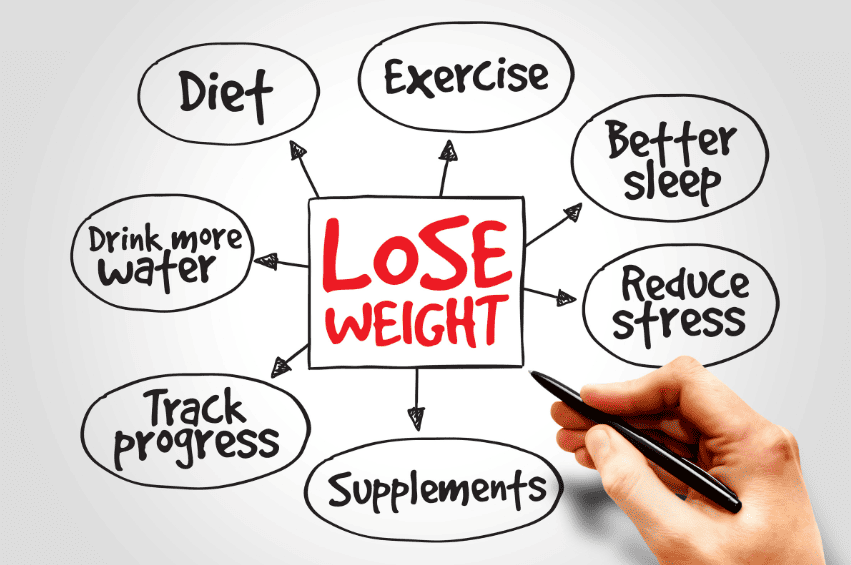How to lose weight and feel good about your body? This is a question that seems to puzzle millions of people across the globe.
Nutrition is the cornerstone of our health and well-being. It is a key player in our everyday lives, providing the fuel that our bodies require to function effectively.
The food we consume is more than just a source of energy; it contains essential nutrients – vitamins, minerals, proteins, carbohydrates, and fats – that are crucial for the development, repair, and maintenance of our body tissues.
Our eating habits can significantly influence our overall wellness, affecting everything from our physical performance to our mental clarity. Proper nutrition isn’t just about losing or maintaining weight; it’s about equipping our bodies with the necessary materials to lead a healthy, invigorating life.
Understanding and implementing sound nutritional practices can pave the way for a revitalized you – aiding in weight loss and catalyzing a sense of overall well-being.
On this post, let’s take a look at six practical tips on how you can lose weight effectively while staying healthy.
#1 Hire a Nutrition Coach
A nutrition coach can provide personalized dietary advice tailored to your body’s specific needs and your personal health goals. They can help you understand how different foods affect your body and guide you to make healthier food choices.
Hiring a nutrition coach can motivate you to stay on track and provide invaluable support as you embark on your weight loss journey. More importantly, a lot of people who are on this journey for the first time will have a lot of questions about the process and it’s always better to get professional advice.
Hiring a professional can be an excellent way to get started on your path towards losing weight and feeling good again. From the right diet to the right exercises, a nutrition coach can equip you with the knowledge and tools to achieve your desired results.
#2 Adopt a Balanced Diet
Include a variety of nutrient-dense foods in your meals like fruits, vegetables, lean proteins, and whole grains. This will ensure your body gets a balanced mix of essential nutrients it needs to function optimally.
Avoid heavily processed and sugary foods that offer little nutritional value but contribute to weight gain. Instead, focus on incorporating whole, fresh foods into your diet. Don’t restrict yourself too much – balance is the key.
Moreover, a lot of stress can actually come from the bad food intake we practice on a daily basis. Whether we are aware of it or not. Allow yourself some treats once in a while so you don’t feel deprived. Remember, healthy eating should be sustainable and enjoyable.
Moreover, crash diets and extreme restrictions can lead to nutrient deficiencies, which can have detrimental effects on your health. If you struggle with sticking to a balanced diet, seek the help of a professional who can guide and support you in making healthier food choices.
#3 Maintain Portion Control
Paying attention to portion sizes can help prevent overeating. Use measuring cups or a food scale to ensure you’re consuming the right amount of food. Be mindful of portion sizes, and avoid eating straight from the bag or container.
Take your time to enjoy your meals, chewing slowly and savoring each bite. This will help you feel satisfied with smaller portions and prevent overeating. For example, doctors agree that one of the biggest contributors to obesity in developed countries is the increased portion sizes of meals, so being mindful of your portions can go a long way in aiding weight loss.
While the sheer size of the meal shouldn’t be the only factor considered, it is an important one that should not be overlooked. A plate full of healthy vegetables, lean protein, and a moderate amount of whole grains is all you need to feel satisfied, energized, and fueled.
#4 Regular Exercise
Incorporate physical activity into your daily routine, such as walking, cycling, or strength training. Regular exercise can help you burn calories and lose weight while boosting your mood and energy levels. It also offers numerous health benefits, including reducing the risk of chronic diseases and improving cardiovascular health.
Exercise is not just about weight loss; it’s a key component of overall wellness. Find activities you enjoy, and make them a regular part of your routine. If you’re new to exercise or have any underlying health conditions, consult with a medical professional before starting any physical activity.
In addition, a trainer can also help you create an exercise plan tailored to your specific needs and goals. When combined with a balanced diet, regular exercise can aid in weight loss and improve overall well-being.
Drinking enough water keeps your metabolism functioning at its best and can help to control your appetite, making weight loss easier. Aim to drink at least eight glasses of water a day, and more if you’re physically active.
Additionally, try to reduce your intake of sugary drinks like soda and juice, which can be high in calories and contribute to weight gain. Instead, opt for plain water or infuse it with fruits or herbs for added flavor. Staying hydrated also helps flush out toxins from the body and keeps your skin looking healthy and radiant.
Around 2 liters of water a day, or about 8 cups, is generally recommended for adults, but the amount may vary depending on factors such as physical activity level and climate. However, this shouldn’t include only drinking water, but also taking liquids through fruits and vegetables, which are high in water content.
Additionally, if you’re looking for a quick and efficient way to boost your hydration levels, consider exploring IV therapy options in Huntington Beach or any other location near you. IV therapy delivers fluids, vitamins, and minerals directly into your bloodstream, providing rapid hydration and potentially enhancing your overall well-being.
#6 Get Adequate Sleep
Sleep has an often overlooked impact on weight management. Lack of sleep can interfere with your body’s hunger hormones, leading to increased appetite and weight gain.
Prioritize getting 7-9 hours of sleep per night for optimal health. Good sleep also helps to regulate your metabolism and energy levels, making it easier to stay active and make healthy food choices.
If you struggle with getting enough rest, try establishing a regular sleep schedule, avoiding caffeine and heavy meals before bed, and creating a comfortable sleeping environment. A well-rested body is better equipped to lose weight and maintain overall wellness.
Incorporating these essential tips into your lifestyle can help you lose weight and feel good again. Remember, proper nutrition is not a short-term fix but a long-term investment in your health.
Seek the support of a nutrition coach, adopt a balanced diet, practice portion control, exercise regularly, stay hydrated, and prioritize sleep for optimal results. With dedication and consistency, you can achieve a healthy weight and overall well-being, paving the way for a more fulfilling life.
So, take the first step towards a healthier you today! Keep in mind that these tips are not just for losing weight but also for leading a healthy and happy life.


















